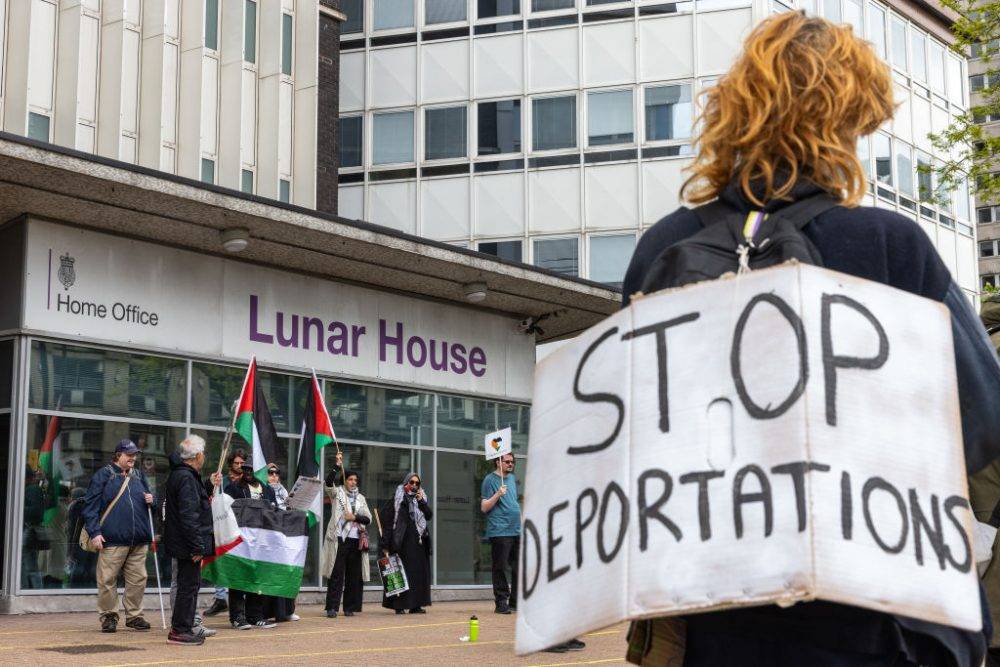
Activists protest against the UK government's recently passed Safety of Rwanda bill and plans for deportation flights outside the Home Office's Lunar House immigration reporting centre on 4th May 2024 in London, United Kingdom. Speakers at the protest made particular reference to the deportation of Palestinian detainees. (photo by Mark Kerrison/In Pictures via Getty Images)
Over the past few years, the United Kingdom has been exploring ways to deport asylum seekers to other countries as part of its efforts to deter illegal migration. In its latest move, the government has passed the Rwanda Bill and successfully negotiated a deal with Rwanda to facilitate the deportation of asylum seekers.
The measure received support in the British parliament, aligning with Prime Minister Rishi Sunak’s agenda of “stopping the boats”. The scale of this plan is significant, with about 2,000 of 52,000 individuals slated for deportation within the next 10 to 12 weeks.
Under the terms of this agreement, asylum seekers, both young and old who arrived in the UK through unauthorised routes may find themselves whisked 6,400km away to Rwanda, supposedly for good. Even lone children face the risk of deportation because they are classified as young adults.
While some view this as consistent with Rwanda’s tradition of hospitality, the agreement has sparked criticism from human rights activists, politicians and the United Nations High Commissioner for Refugees (UNHCR). Concerns revolve around human rights violations and the lack of adequate safeguards and standards in this arrangement. Civil society groups and opposition political parties in Rwanda also have spoken out against the deal.
More so, Rwanda, which has a history of human rights abuses, has its refugees in the neighbouring Democratic Republic of the Congo (DRC) and Uganda. The questions linger about its capacity to absorb an influx of vulnerable migrants, given its already strained resources and political tensions. More concerning is the lack of transparency about the deal. Neither government has provided details on how the partnership will work, leaving many to speculate on its implications for both the migrants and Rwandan citizens.
Despite all concerns and criticisms, the Rwandan government has pledged to accept these migrants in exchange for £120 million in the so-called “development deal” from the UK. Both governments agree that this plan offers a fresh start for migrants, with promises of support including training, accommodation and healthcare for up to five years.
This is not the first time such a deal has been proposed in Africa. Previously, Israel introduced a similarly contentious deportation plan to Rwanda and Uganda from 2014 to 2017. In January, reports suggest that Israel has been in discussions with the DRC about potential “voluntary migration plans” for Palestinians from Gaza.
Furthermore, unconfirmed reports claim that Denmark is also in negotiations with Rwanda for a similar deal. Botswana recently became the latest country to receive and reject a proposal to accept asylum-seekers from the UK. Foreign Minister Lemogang Kwape revealed this development in a recent interview with Newsroom Africa.
These instances highlight a growing trend of countries exploring migration agreements, often under controversial circumstances.
For the African continent, there are significant consequences. The deportation of asylum seekers to Rwanda sets a concerning precedent that can exacerbate existing migration problems and socio-economic disparities on the continent. Moreover, the deportation of asylum seekers to Rwanda may trigger a ripple effect, leading to secondary migration flows to neighbouring African countries such as Kenya.Asylum seekers who are unable to integrate or find stability in Rwanda may seek alternative destinations where they perceive better opportunities or support networks. This could result in increased irregular migration, heightened competition for resources, and potential social tensions in neighbouring countries.
The Rwanda Bill truly sets a concerning example for future migration agreements. It shows how richer countries can evade their international responsibilities to host refugees by transferring them to other countries in exchange for development deals or financial support.
Equally significant is the agency of African countries to refuse such deals, as demonstrated by Botswana’s recent decision. African nations have every right to assert their sovereignty and determine their own migration policies in alignment with their national interests and capacities. Refusing to accept deals that disproportionately burden their resources and social structures is an exercise of this sovereign right.
As the deportation process unfolds, a pervasive sense of uncertainty hangs over those directly affected by the imminent transfers. Recent events have only served to exacerbate tensions, as videos and reports surface of asylum seekers being apprehended and detained in preparation for their relocation to Rwanda. These arrests highlight the troubling reality of abuse and disregard for the rights and well-being of migrants within the immigration system. It reflects systemic failures to uphold principles of dignity, fairness and justice, because individuals are subjected to arbitrary detention and coercion in the name of migration enforcement.
In light of these developments, we must confront and challenge the systemic injustices inherent in immigration enforcement. International laws should hold all countries equally accountable and not allow them to act with impunity. We must demand accountability for those responsible for the mistreatment of asylum seekers and advocate for policies that uphold the rights and dignity of all migrants, regardless of their status because the true cost of this deal is not measured in financial gain but in human suffering and the abuse of fundamental human rights.
As the international community continues to observe this developing story, the plight of UK asylum seekers remains caught between the politics of migration and the pursuit of a better life.
Naledi Ramontja is a research assistant at the University of Johannesburg’s Institute for Pan-African Thought and Conversation.
 (1).png)
 8 months ago
38
8 months ago
38


















